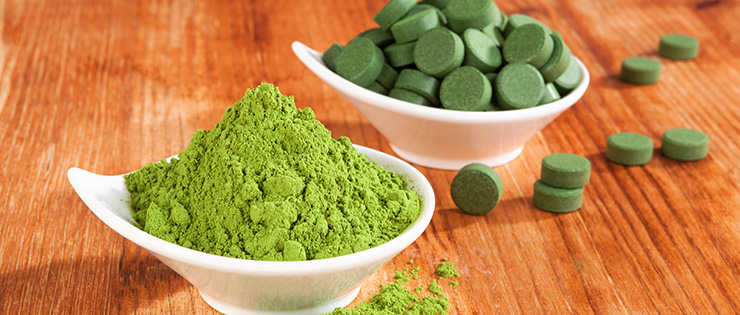
What Is Spirulina?
Spirulina is a nutrient-dense natural blue-green microalgae that grows in fresh alkaline lakes, normally in tropical or subtropical places like Hawaii or Mexico. However, as demand has grown for this algae it is now popularly being grown in controlled ‘spirulina farms’ to keep the conditions optimal.
The unique taste isn’t for everyone, a sensitive palate may sense a mushroom or light fish taste, but let me assure you this is 100% just plants and a great addition to a vegetarian or vegan diet. Why? Well, it’s one of the very few plant-based sources of ‘complete protein’ meaning it has all nine essential amino acids needed for your body to readily absorb the benefits. It doesn’t stop there as it is also rich in essential fatty acids and vitamin B12 which can sometimes be challenging nutrients to consume in a plant-based diet.
But that’s just skimming the surface of benefits as it’s without a doubt one of the most all in one nutrient-rich supplement on the market. In a nutshell, spirulina contains the following nutrition:
- Antioxidants
- Calcium
- Complete protein (all 9 essential amino acids)
- Omega 3, 6 & 9
- Gamma-linolenic acid & linoleic acid
- Iron
- Magnesium
- Phosphorus
- Potassium
- Vitamins A, E & K
- Vitamin B12, B1, B2, B3
What are the benefits?
Let me explain how this list of science looking words can benefit your health. Remember to always check with your doctor first, but it’s fair to say there are particular groups of people who may especially benefit from supplementing including immune-compromised, vegans, vegetarians, athletes, diabetics, overweight and seniors.
Immune booster – High in powerful antioxidants translates into nourishing for the immune system as they protect damaged cells, interestingly it’s a certain phytonutrient called phycocyanin that gives spirulina it’s a unique blue-green colour. Also, due to its high calcium content, this can be a very beneficial supplement for the ageing populations bone health.
Energy booster - The benefits of spirulina can be felt very fast, especially in powder form, as it’s rich in both iron and b-vitamins which can help reduce fatigue. It can also give you a sporting edge as helps with reducing muscle fatigue and damage, improving endurance.
Cardiovascular health – Being an antioxidant powerhouse, means it is fantastic for heart health fighting free radical damage that can lead to inflammation and blockages, it also helps lower your bad LDL cholesterol and triglyceride levels.
Weight management – Protein gives us a sense of satiety so great for suppressing the appetite. Also, when we are truly nourished, we crave fewer foods and spirulina certainly does that. It also helps balance blood sugar levels, which can be great for insulin resistance and diabetes.
Detox –Spirulina is a natural detoxifier and antimicrobial, helping your body get rid of toxins it doesn’t need. Most foods this deep green colour in nature are good for refreshing your body inside and out.
How to source?
The simple rule is if you are going to consume something every single day, be it food or supplements, you may as well make sure it is the best on the market. Most health food stores and even some supermarkets now sell a version of spirulina, though not all are created equal. You want to make sure that it contains no additives and ideally organic, as it can be easily contaminated with toxins and heavy metals when not sourced from clean alkaline waters. Spirulina comes in two forms, powder or tablets. The powder is the more potent simply because you need less of it to tick your suggested requirement and its more readily absorbed by the body. The downside is it is an acquired taste for some, but an easy hack is to add it to a smoothie with a frozen banana, a teaspoon of nut butter or drizzle of honey. If you prefer tablets I would suggest working your way up with dosages, for example, start with 3 tablets per day and work your way up to 6, the same goes for powder 1 teaspoon, working your way up to 1 tablespoon.